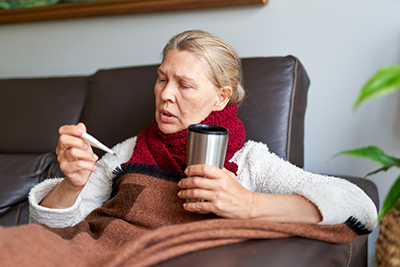Lowering Your Immune Age
As we age, our immune system gets weaker. This natural, gradual deterioration is called "immunosenescence" and starts to affect most people's health at about 60. It's the primary reason those over the age of 70 are at the greatest risk of COVID-19, particularly those already dealing with underlying health conditions. According to Shai Shen-Orr, an immunologist at the Technion Israel Institute of Technology, some people have an 'immune system age' that differs significantly from their chronological age.

In a typical winter flu season, it's rare that people under 65 become sick enough to be hospitalized. In the next age group up to 75, about 20% may be hospitalized, but it's still uncommon that someone dies of the flu. But as many as half of those over 75 are hospitalized, with a mortality rate approaching 40%. Additionally, many of those over 75 who do survive don't fully recover. This pattern is also being seen with COVID-19. According to Janet Lord at the University of Birmingham, the difference for most people is immunosenescence.
Immune function decline begins during puberty and can be affected by many modifiable lifestyle choices. If you're overweight, smoke, don't eat well, are deficient in important nutrients, are sedentary, often under stress, or you don't get 8 hours of sleep each night, you're likely to have an immune system age older than your chronological years.

Chronological age and biological age are usually similar, but some believe they can differ by as much as 20 years. Lifestyle changes can cause biological and immune age to go up or down. Epigenetics is an active area of research that has proven that our health and longevity aren't only controlled by our genetic inheritance. As G.A. Bray stated, "Genes load the gun, the environment pulls the trigger." Fortunately, the dietary and lifestyle choices we make can affect our genes positively.
Sleep
Getting at least 8 hours of restorative sleep each night is critical to allowing the immune system to respond to pathogens, while allowing the brain to do necessary housekeeping to remove cells that are associated with dementia and Alzheimer's disease. According to Mathew Walker, sleep is a "non-negotiable biological necessity." Short sleep predicts a shorter life.
Insulin Control
Insulin is a hormone produced by the pancreas that allows the body to use glucose from carbohydrates for energy or to store as fat for future use. It also plays a key role in transporting amino acids into cells, including the brain. Insulin helps keep blood sugar levels from becoming too high or too low. Insulin resistance (also called hyperinsulinemia or type 2 diabetes) is a condition where certain cells don't respond normally to insulin. Insulin can become elevated in the body, but the cells remain resistant to its effects. The resulting chronically high insulin levels can potentially lead to an increase in cholesterol levels, higher blood pressure, and weight gain. Insulin is also a satiety hormone, so when there's too much, we don't experience the signals that tell us to stop eating.

Implementing timed nutrition or fasting can turn on two important processes: ketosis and autophagy. Ketosis is a process where the body switches from using glucose as its main fuel source to using ketones – compounds produced by breaking down fat to serve as an alternate energy source. Autophagy is turned on by fasting and activates many longevity pathways and processes that are crucial for our cells to survive. Autophagy destroys viruses, bacteria, and cancer cells. In a Yale University study, researchers found that a ketogenic diet activated a special subset of T cells in the lungs that helped trap the influenza virus. Some people find that eating strictly in an 8-hour window works well for weight loss and stabilization. Others prefer fasting for two non-consecutive days (i.e. every Monday and Thursday). You have to discipline yourself to stop snacking between meals or you will never achieve ketosis or autophagy, though it does get easier once you're used to it. I recommend stopping breakfast and eating two meals a day.
Making a few deliberate changes to your daily routine can help lower your immune age. Improving your sleep, diet, and when you eat can lead to a wide range of health benefits.
Health Disclaimer. Copyright ©2020. Nathan Zassman is a trained nutrition practitioner and the owner of Aviva Natural Health Solutions.
